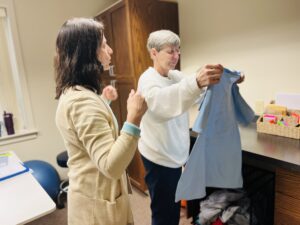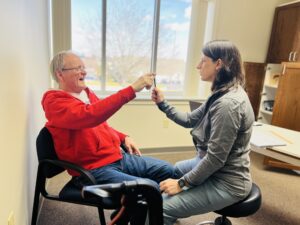Written by Grace Wells, OTR/L
Article
As I celebrate my first full month of joining HARTZ Physical Therapy as their FIRST Occupational Therapist I thought I’d celebrate Occupational Therapy Month by talking about this profession that I love!
What is Neurological Occupational Therapy?
The term “occupation” doesn’t only refer to a paid job, but also daily activities that are important to a person including their self-care routine, participating in household tasks, participating in leisure tasks and engaging in work related tasks. The primary goal of a neuro occupational therapist is to help people engage back into their daily activities that they need to do or want to do after a sudden or progressive neurological event. This is done with a collaborative approach with patients and families. Here are some areas a neuro occupational therapist can address:
Improve Participation in Self-care, Household, Leisure, and Work Activities
An occupational therapist will start by discussing with you the specific areas of your daily life that are difficult to perform. By the end of the initial session, we will establish specific goals and identify tasks that you want to return to completing more independently.
Improve Hand Eye Coordination for Large & Small Coordination Tasks
A neurological event or condition may make it difficult to move your body in a coordinated manner, accurately reach for something or use your hands to complete small tasks such as buttoning, opening containers or writing legibly. Therapeutic tasks can be added to your program to address these areas and improve your ability to complete your daily occupations.
To Relearn Natural Movements Related to Lost Motor Function
A loss or imbalance of mind muscle connection can impact the ability to naturally move your body. This may look like being unable to control or even move your body in ways prior to your medical event. Neuro muscular reeducation can improve the mind muscle connection and improve motor function.
Improve Balance
Reaching outside your base of support while both sitting and standing is part of your daily routine. Having good balance while you complete your everyday tasks is essential in keeping yourself safe. Occupational therapy will address balance as part of your program to return to activities of daily living.
Address Cognitive Skills
Difficulty in organizing thoughts, recalling ideas/events, concentrating on the task at hand can all have a significant impact on the ability to complete daily routines. With the support of an occupational therapist, areas of functional cognition can be addressed to allow for active participation in daily tasks.
Address Visual Impairments
The eye is the lens through which the brain sees. With neurological conditions, how the brain interprets what the eyes capture can be impacted. Eye movement patterns can also be affected when there is an imbalance with the eye musculature. A visit with an occupational therapist can address visual perception and eye movement difficulties with a focus on functional improvement of everyday tasks.
Educate on Energy Conservation
Following a hospital stay or a decline in your ability to easily move around can alter your endurance and strength and you may become fatigued easily. Along with endurance and strength training, an occupational therapist can educate on ways to simplify a task to effectively and efficiently use your energy to complete what is important to you.
Educate on Modification of Environment & Adaptive Strategies
With a goal of improving functional independence, another approach is looking at how the environment can be modified to allow for improved ability to complete a task. Occupational therapists are the experts in teaching adaptive strategies, making environmental modifications and educating on the use of adaptive devices.
Educate on Home Safety
When experiencing changes in strength, motor coordination, endurance, balance, vision and cognition, moving and working safely around the home may be a concern. Working with an occupational therapist can help you to address home safety issues which will allow you to live within your environment with safety as a priority.
Regain Independence
By using a task-specific approach an occupational therapist will work side by side with you to increase your independence with the daily tasks. With therapeutic tasks, education, adaptive devices and modified approaches, an occupational therapist will help you take steps towards improving your quality of life and engaging in what is important to you.
If you have any questions about our neurological occupational therapy services at HARTZ PT please reach out to via email at gwells@hartzpt.com or call me at 717.735.8880.

